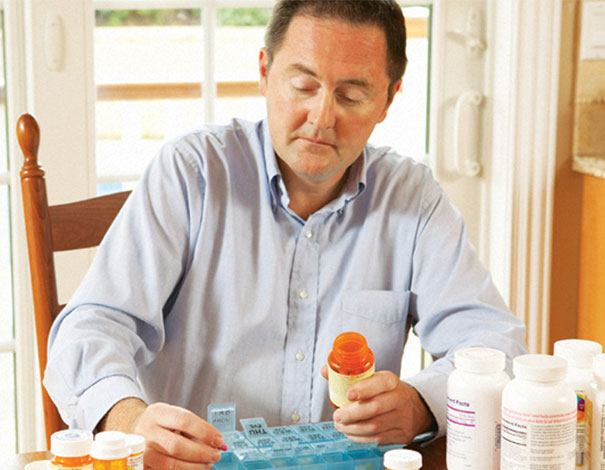Rob, transplant recipient
You are likely taking many medicines right now that all play different and important roles in your recovery. With so many medicines, keeping track of everything isn’t always easy. But it’s extremely important you take your medicines exactly as your doctor tells you to. Here are 10 tips to help you manage your medicines.
- Know their names and what they do. Take time to learn the name of each of your medicines and why your doctor has you take it. For example, your immunosuppressant medicines help prevent graft rejection (when your immune system rejects the donated cells). They can also help prevent or treat GVHD.
- Take your medicines exactly as directed. Don’t change or stop taking your medicines without first talking to your doctor, even if you feel better. If you stop taking your medicines suddenly, it can make you feel worse or lead to life-threatening consequences.
- Keep track of how and when to take them. Some medicines need to be taken with food. Others may need to be taken before you eat. Some might need to be taken more than once a day. Whenever you start a new medicine, make sure you understand how and when you should take each dose. Your pharmacist can help you understand how to best take your medicines.
- Learn how they might make you feel. When you start taking new medicines, ask your doctor or pharmacist about the side effects. Find out which side effects are common, and which ones could be the warnings signs of an emergency. If you have any concerns about how a medicine is making you feel, contact your transplant team right away.
- Missed a dose? Know what to do. Talk to your doctor or pharmacist to find out what you should do if you miss a dose and follow their instructions. For some medicines, if you miss a dose, you should take it as soon as you remember. For other medicines, your doctor might tell you to go back to your regular schedule and skip the missed dose. If you miss a dose and aren’t sure what to do, always ask your doctor or pharmacist.
- Know how to store your medicines. Many people store medicines in their bathroom medicine cabinet, but that’s not the best place for them. Heat and humidity can damage your medicines, so never store them in the bathroom. Look for a cool, dry spot in your home that’s also out of the reach of children. Some medicines need to be stored in the dark or in the refrigerator, so check with your pharmacist about any special storage needs.
- Be careful with foods, drinks and other medicines. Some foods and medicines just don’t get along. Many medicines interact with certain drugs, including some over-the-counter medicines and herbal therapies. Even grapefruit and grapefruit juice interact with some medicines. Never start any new medicines, supplements or foods without checking with your transplant team first.
- Get to know your pharmacist. When you’re taking many medicines, going to only one pharmacy can help you stay organized. Get to know the pharmacists at your pharmacy or in your transplant clinic. They can be a helpful resource for you when you have questions about your medicines.
- Refill your medicines before they run out. Keep an eye on the number of pills you have left and be sure to get your prescription refilled before you run out. Some pharmacies have programs in place to automatically refill your prescription a week or so before it is scheduled to run out. Check with your local pharmacy to see if that’s an option for you. If you use a mail-order program through your insurance company, be sure to allow enough time for shipping. Also, don’t change to a different formulation of a medicine unless your doctor or transplant pharmacist approves. Different formulations (including generic medicines) may act differently in your body.
- Ask for help if you’re worried you can’t afford your medicines. The medicines you take after transplant are very important to your health and recovery. If you ever have trouble paying for any of them, let your transplant care team or social worker know right away. There is help available from Be The Match® and other organizations that can help cover the costs of medicines. Some drug companies also have patient programs for free or reduced-cost medicines. Your transplant center social worker can help you find and apply for grants you may be eligible for or direct you to the person who can best assist you. You can learn more about financial assistance at BeTheMatch.org/grants.

